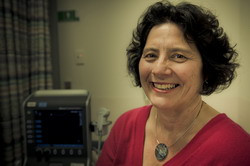Ngāti Porou doctor and women’s health expert Associate Professor Beverley Lawton has received one of New Zealand’s most valuable research grants to help young pregnant Māori women and their children get the best care possible to improve their health and well-being.
Dr Lawton is the Director of the Women’s Health Research Centre at the University of Otago, Wellington, and is lead researcher on the Whānau Manaaki programme, which will be funded by a $4.7 million grant from the Health Research Council of New Zealand (HRC). Collaboration with Ngati Pahauwera will provide essential tikanga and leadership to guide the research.
The five-year programme will explore the health care delivery system and the structural determinants of health – including housing, racism, transport, income, and education – that impact on the health of Māori women and their babies and whānau.
HRC Chief Executive Professor Kath McPherson says too many children are at risk of poor outcomes because they don’t get the early support they need. This programme directly supports New Zealand’s vulnerable children, which is a key priority across all government agencies.
“Whānau Manaaki builds on the excellent work of Dr Lawton and her colleagues on previous HRC-funded research that has focused on Māori mothers and their babies. This includes a study of severe maternal health events –‘near misses’– which found that almost 40 per cent of cases were potentially preventable and most of these were due to clinical error. This programme is led by Māori using Māori tikanga practice, which will help ensure we have maternity and childcare that works for Māori.”
Professor McPherson says it is fantastic to have such a high quality Māori-led programme funded under the HRC’s Rangahau Hauora investment stream. The last HRC programme grant to be awarded for Māori-led health research was in 2011 to Dr Paul Reynolds.
“New Zealand has a growing pool of incredibly talented Māori health researchers who have been supported by the HRC as they’ve furthered their careers and who are now going on to mentor the next generation of Māori health research leaders. This prestigious programme grant shows the undeniable benefits of investing in building a highly skilled Māori health research workforce,” says Professor McPherson.
The first years of life starting from pregnancy are crucial for good health outcomes and for the long-term achievements of children as adolescents and adults. However, Dr Lawton says that for pregnant Māori women and their children “the social and health disadvantages are stark”.
“If we can reduce the barriers and meet the needs of the whānau/family from pregnancy into childhood these families will have greater potential to maximise their health and well-being,” says Dr Lawton. “For this, they require a warm constant house, education, transport to health events for mum and babe, support for good food, and a safe environment to mention but a few of the basic requirements. These families want the best for themselves and their children and reducing barriers to best care and environment is the first step.”
The Whānau Manaaki programme will consist of three projects: a community intervention that will integrate maternal and child care services into one care pathway; and two projects that explore preterm delivery, which is a major contributor to disability and death for Māori.
Professor McPherson says the Government’s record $97 million-boost in investment to the HRC, which was announced in last month’s Budget, has had an immediate impact.
“With this increased investment, we’ve now been able to fund nine exceptionally high quality health research programmes, including the influential and world-renowned longitudinal studies in Christchurch and Dunedin, and 52 projects. This will make a huge difference to what New Zealand’s health researchers can achieve on a national and global scale to significantly improve health care and save lives.”
See below for the full list of 2016 HRC programme recipients or to read lay summaries of the research programmes, go to our research repository and filter for ‘Researcher Initiated Proposals,’ ‘Programmes’ and ‘2016’.
2016 HRC programme grant recipients
Professor Wickliffe Abraham, University of Otago, Dunedin
Harnessing brain mechanisms to tackle Alzheimer’s disease
60 months, $4,933,051
Professor Tony Blakely, University of Otago, Wellington
BODE3: Modelling preventive interventions to improve health and social outcomes
60 months, $4,945,837
Professor Frank Bloomfield, University of Auckland
Feeding preterm babies for life-long health
60 months, $4,999,704
Professor Michael Dragunow, University of Auckland
Vascular and inflammatory mediators of neurodegeneration
60 months, $4,999,998
Associate Professor John Horwood, University of Otago, Christchurch
The Christchurch health and development study - Birth to 40 years
60 months, $4,363,672
Professor Rodney Jackson, University of Auckland
Vascular risk informatics using epidemiology & the web 2020 (VIEW2020)
60 months, $4,976,577
Associate Professor Beverley Lawton, University of Otago, Wellington
Whānau manaaki
60 months, $4,697,066
Dr Colin McArthur, Medical Research Institute of New Zealand
Platform trial optimising interventions in severe community acquired pneumonia
60 months, $4,814,924
Professor Richie Poulton, University of Otago, Dunedin
A lifecourse study on aging processes to inform early intervention strategies
60 months, $4,994,717
